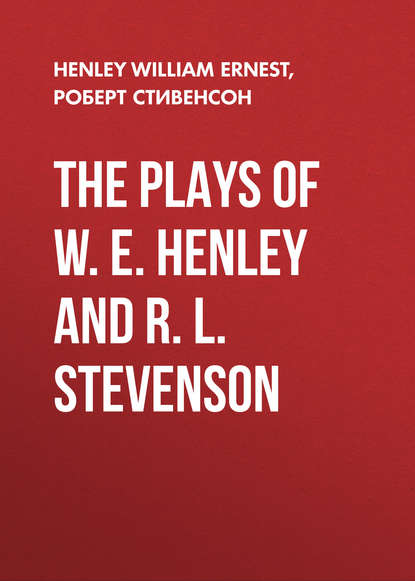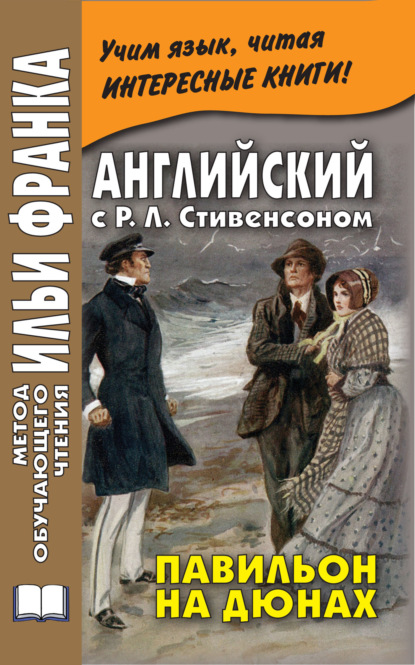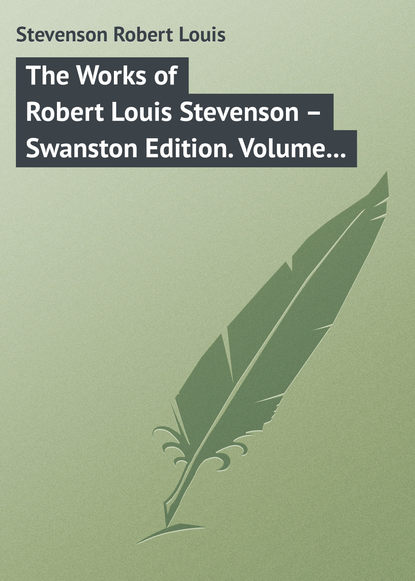 Полная версия
Полная версияПолная версия:
Роберт Льюис Стивенсон The Plays of W. E. Henley and R. L. Stevenson
- + Увеличить шрифт
- - Уменьшить шрифт

William Ernest Henley
The Plays of W. E. Henley and R. L. Stevenson
DEACON BRODIE OR THE DOUBLE LIFE
A MELODRAMA IN FIVE ACTS AND EIGHT TABLEAUX
PERSONS REPRESENTED
William Brodie, Deacon of the Wrights, Housebreaker and Master Carpenter.
Old Brodie, the Deacon’s Father.
William Lawson, Procurator-Fiscal, the Deacon’s Uncle.
Andrew Ainslie, Humphrey Moore, George Smith, Robbers in the Deacon’s gang.
Captain Rivers, an English Highwayman.
Hunt, a Bow Street Runner.
A Doctor.
Walter Leslie.
Mary Brodie, the Deacon’s Sister.
Jean Watt, the Deacon’s Mistress.
Vagabonds, Officers of the Watch, Men-servants.
The Scene is laid in Edinburgh. The Time is towards the close of the Eighteenth Century.
The Action, some fifty hours long, begins at eight p.m. on Saturday and ends before midnight on Monday.
Note. —Passages suggested for omission in representation are enclosed in square brackets, thus [ ].
SYNOPSIS OF ACTS AND TABLEAUX

LONDON: PRINCE’S THEATRE
2d July 1884

MONTREAL
26th September 1887

ACT I
TABLEAU I.
The Double Life
The Stage represents a room in the Deacon’s house, furnished partly as a sitting-, partly as a bed-room, in the style of an easy burgess of about 1780. C., a door; L. C., a second and smaller door; R. C., practicable window; L., alcove, supposed to contain bed; at the back, a clothes-press and a corner cupboard containing bottles, etc. Mary Brodie at needlework; Old Brodie, a paralytic, in wheeled chair, at the fireside, L.
SCENE I To these Leslie, CLeslie. May I come in, Mary?
Mary. Why not?
Leslie. I scarce knew where to find you.
Mary. The dad and I must have a corner, must we not? So when my brother’s friends are in the parlour he allows us to sit in his room. ’Tis a great favour, I can tell you; the place is sacred.
Leslie. Are you sure that ‘sacred’ is strong enough?
Mary. You are satirical!
Leslie. I? And with regard to the Deacon? Believe me, I am not so ill-advised. You have trained me well, and I feel by him as solemnly as a true-born Brodie.
Mary. And now you are impertinent! Do you mean to go any further? We are a fighting race, we Brodies. Oh, you may laugh, sir! But ’tis no child’s play to jest us on our Deacon, or, for that matter, on our Deacon’s chamber either. It was his father’s before him: he works in it by day and sleeps in it by night; and scarce anything it contains but is the labour of his hands. Do you see this table, Walter? He made it while he was yet a ’prentice. I remember how I used to sit and watch him at his work. It would be grand, I thought, to be able to do as he did, and handle edge-tools without cutting my fingers, and getting my ears pulled for a meddlesome minx! He used to give me his mallet to keep and his nails to hold; and didn’t I fly when he called for them! and wasn’t I proud to be ordered about with them! And then, you know, there is the tall cabinet yonder; that it was that proved him the first of Edinburgh joiners, and worthy to be their Deacon and their head. And the father’s chair, and the sister’s workbox, and the dear dead mother’s footstool – what are they all but proofs of the Deacon’s skill, and tokens of the Deacon’s care for those about him?
Leslie. I am all penitence. Forgive me this last time, and I promise you I never will again.
Mary. Candidly, now, do you think you deserve forgiveness?
Leslie. Candidly, I do not.
Mary. Then I suppose you must have it. What have you done with Willie and my uncle?
Leslie. I left them talking deeply. The dear old Procurator has not much thought just now for anything but those mysterious burglaries —
Mary. I know! —
Leslie. Still, all of him that is not magistrate and official is politician and citizen; and he has been striving his hardest to undermine the Deacon’s principles, and win the Deacon’s vote and interest.
Mary. They are worth having, are they not?
Leslie. The Procurator seems to think that having them makes the difference between winning and losing.
Mary. Did he say so? You may rely upon it that he knows. There are not many in Edinburgh who can match with our Will.
Leslie. There shall be as many as you please, and not one more.
Mary. How I should like to have heard you! What did uncle say? Did he speak of the Town Council again? Did he tell Will what a wonderful Bailie he would make? O why did you come away?
Leslie. I could not pretend to listen any longer. The election is months off yet; and if it were not – if it were tramping upstairs this moment – drums, flags, cockades, guineas, candidates, and all! – how should I care for it? What are Whig and Tory to me?
Mary. O fie on you! It is for every man to concern himself in the common weal. Mr. Leslie – Leslie of the Craig! – should know that much at least.
Leslie. And be a politician like the Deacon? All in good time, but not now. I hearkened while I could, and when I could no more I slipped out and followed my heart. I hoped I should be welcome.
Mary. I suppose you mean to be unkind.
Leslie. Tit for tat. Did you not ask me why I came away? And is it usual for a young lady to say ‘Mr.’ to the man she means to marry?
Mary. That is for the young lady to decide, sir.
Leslie. And against that judgment there shall be no appeal?
Mary. O, if you mean to argue! —
Leslie. I do not mean to argue. I am content to love and be loved. I think I am the happiest man in the world.
Mary. That is as it should be; for I am the happiest girl.
Leslie. Why not say the happiest wife? I have your word, and you have mine. Is not that enough?
Mary. Have you so soon forgotten? Did I not tell you how it must be as my brother wills? I can do only as he bids me.
Leslie. Then you have not spoken as you promised?
Mary. I have been too happy to speak.
Leslie. I am his friend. Precious as you are, he will trust you to me. He has but to know how I love you, Mary, and how your life is all in your love of me, to give us his blessing with a full heart.
Mary. I am sure of him. It is that which makes my happiness complete. Even to our marriage I should find it hard to say ‘Yes’ when he said ‘No.’
Leslie. Your father is trying to speak. I’ll wager he echoes you.
Mary (to Old Brodie). My poor dearie! Do you want to say anything to me? No? Is it to Mr. Leslie, then?
Leslie. I am listening, Mr. Brodie.
Mary. What is it, daddie?
Old Brodie. My son – the Deacon – Deacon Brodie – the first at school.
Leslie. I know it, Mr. Brodie. Was I not the last in the same class? (To Mary.) But he seems to have forgotten us.
Mary. O yes! his mind is wellnigh gone. He will sit for hours as you see him, and never speak nor stir but at the touch of Will’s hand or the sound of Will’s name.
Leslie. It is so good to sit beside you. By and by it will be always like this. You will not let me speak to the Deacon? You are fast set upon speaking yourself? I could be so eloquent, Mary – I would touch him. I cannot tell you how I fear to trust my happiness to any one else – even to you!
Mary. He must hear of my good fortune from none but me. And besides, you do not understand. We are not like families, we Brodies. We are so clannish, we hold so close together.
Leslie. You Brodies, and your Deacon!
Old Brodie. Deacon of his craft, sir – Deacon of the Wrights – my son! If his mother – his mother – had but lived to see!
Mary. You hear how he runs on. A word about my brother and he catches it. ’Tis as if he were awake in his poor blind way to all the Deacon’s care for him and all the Deacon’s kindness to me. I believe he only lives in the thought of the Deacon. There, it is not so long since I was one with him. But indeed I think we are all Deacon-mad, we Brodies. Are we not, daddie dear?
Brodie (without, and entering). You are a mighty magistrate, Procurator, but you seem to have met your match.
SCENE II To these, Brodie and LawsonMary (curtseying). So, uncle! you have honoured us at last.
Lawson. Quam primum, my dear, quam primum.
Brodie. Well, father, do you know me? (He sits beside his father and takes his hand.)
[Old Brodie. William – ay – Deacon. Greater man – than – his father.
Brodie. You see, Procurator, the news is as fresh to him as it was five years ago. He was struck down before he got the Deaconship, and lives his lost life in mine.
Lawson. Ay, I mind. He was aye ettling after a bit handle to his name. He was kind of hurt when first they made me Procurator.]
Mary. And what have you been talking of?
Lawson. Just o’ thae robberies, Mary. Baith as a burgher and a Crown offeecial, I tak’ the maist absorbing interest in thae robberies.
Leslie. Egad, Procurator, and so do I.
Brodie (with a quick look at Leslie). A dilettante interest, doubtless! See what it is to be idle.
Leslie. Faith, Brodie, I hardly know how to style it.
Brodie. At any rate, ’tis not the interest of a victim, or we should certainly have known of it before; nor a practical tool-mongering interest, like my own; nor an interest professional and official, like the Procurator’s. You can answer for that, I suppose?
Leslie. I think I can; if for no more. It’s an interest of my own, you see, and is best described as indescribable, and of no manner of moment to anybody. [It will take no hurt if we put off its discussion till a month of Sundays.]
Brodie. You are more fortunate than you deserve. What do you say, Procurator?
Lawson. Ay is he! There is no a house in Edinburgh safe. The law is clean helpless, clean helpless! A week syne it was auld Andra Simpson’s in the Lawnmarket. Then, naething would set the catamarans but to forgather privily wi’ the Provost’s ain butler, and tak’ unto themselves the Provost’s ain plate. And the day, information was laid before me offeecially that the limmers had made infraction, vi et clam, into Leddy Mar’get Dalziel’s, and left her leddyship wi’ no sae muckle’s a spune to sup her parritch wi’. It’s unbelievable, it’s awful, it’s anti-christian!
Mary. If you only knew them, uncle, what an example you would make! But tell me, is it not strange that men should dare such things, in the midst of a city, and nothing, nothing be known of them – nothing at all?
Leslie. Little, indeed! But we do know that there are several in the gang, and that one at least is an unrivalled workman.
Lawson. Ye’re right, sir; ye’re vera right, Mr. Leslie. It had been deponed to me offeecially that no a tradesman – no the Deacon here himsel’ – could have made a cleaner job wi’ Andra Simpson’s shutters. And as for the lock o’ the bank – but that’s an auld sang.
Brodie. I think you believe too much, Procurator. Rumour’s an ignorant jade, I tell you. I’ve had occasion to see some little of their handiwork – broken cabinets, broken shutters, broken doors – and I find them bunglers. Why, I could do it better myself!
Leslie. Gad, Brodie, you and I might go into partnership. I back myself to watch outside, and I suppose you could do the work of skill within?
Brodie. An opposition company? Leslie, your mind is full of good things. Suppose we begin to-night, and give the Procurator’s house the honours of our innocence?
Mary. You could do anything, you two!
Lawson. Onyway, Deacon, ye’d put your ill-gotten gains to a right use; they might come by the wind but they wouldna gang wi’ the water; and that’s aye a solatium, as we say. If I am to be robbit, I would like to be robbit wi’ decent folk; and no think o’ my bonnie clean siller dirling among jads and dicers. [Faith, William, the mair I think on’t, the mair I’m o’ Mr. Leslie’s mind. Come the night, or come the morn, and I’se gie ye my free permission, and lend ye a hand in at the window forbye!
Brodie. Come, come, Procurator, lead not our poor clay into temptation. (Leslie and Mary talk apart.)
Lawson. I’m no muckle afraid for your puir clay, as ye ca’t.] But hark i’ your ear: ye’re likely, joking apart, to be gey and sune in partnership wi’ Mr. Leslie. He and Mary are gey and pack, a body can see that.
[Brodie. ‘Daffin’ and want o’ wit’ – you know the rest.
Lawson. Vidi, scivi, et audivi, as we say in a Sasine, William.] Man, because my wig’s pouthered do ye think I havena a green heart? I was aince a lad mysel’, and I ken fine by the glint o’ the e’e when a lad’s fain and a lassie’s willing. And, man, it’s the town’s talk; communis error fit jus, ye ken.
[Old Brodie. Oh!
Lawson. See, ye’re hurting your faither’s hand.
Brodie. Dear dad, it is not good to have an ill-tempered son.
Lawson. What the deevil ails ye at the match? ’Od, man, he has a nice bit divot o’ Fife corn-land, I can tell ye, and some Bordeaux wine in his cellar! But I needna speak o’ the Bordeaux; ye’ll ken the smack o’t as weel’s I do mysel’; onyway it’s grand wine. Tantum et tale. I tell ye the pro’s, find you the con.’s, if ye’re able.]
Brodie. [I am sorry, Procurator, but I must be short with you.] You are talking in the air, as lawyers will. I prefer to drop the subject [and it will displease me if you return to it in my hearing].
Leslie. At four o’clock to-morrow? At my house? (to Mary).
Mary. As soon as church is done. (Exit Mary.)
Lawson. Ye needna be sae high and mighty, onyway.
Brodie. I ask your pardon, Procurator. But we Brodies – you know our failings! [A bad temper and a humour of privacy.]
Lawson. Weel, I maun be about my business. But I could tak’ a doch-an-dorach, William; superflua non nocent, as we say; an extra dram hurts naebody, Mr. Leslie.
Brodie (with bottle and glasses). Here’s your old friend, Procurator. Help yourself, Leslie. Oh no, thank you, not any for me. You strong people have the advantage of me there. With my attacks, you know, I must always live a bit of a hermit’s life.
Lawson. ’Od, man, that’s fine; that’s health o’ mind and body. Mr. Leslie, here’s to you, sir. ’Od, it’s harder to end than to begin wi’ stuff like that.
SCENE III To these, Smith and Jean, CSmith. Is the king of the castle in, please?
Lawson (aside). Lord’s sake, it’s Smith!
Brodie (to Smith). I beg your pardon?
Smith. I beg yours, sir. If you please, sir, is Mr. Brodie at home, sir?
Brodie. What do you want with him, my man?
Smith. I’ve a message for him, sir, a job of work, sir!
Brodie (to Smith; referring to Jean). And who is this?
Jean. I am here for the Procurator, about my rent. There’s nae offence, I hope, sir.
Lawson. It’s just an honest wife I let a flat to in Libberton’s Wynd. It’ll be for the rent?
Jean. Just that, sir.
Lawson. Weel, ye can just bide here a wee, and I’ll step down the road to my office wi’ ye. (Exeunt Brodie, Lawson, Leslie, C.)
SCENE IVSmith, Jean Watt, Old BrodieSmith (bowing them out). Your humble and most devoted servant, George Smith, Esquire. And so this is the garding, is it? And this is the style of horticulture? Ha, it is! (At the mirror.) In that case George’s mother bids him bind his hair. (Kisses his hand.) My dearest Duchess, – (To Jean.) I say, Jean, there’s a good deal of difference between this sort of thing and the way we does it in Libberton’s Wynd.
Jean. I daursay. And what wad ye expeck?
Smith. Ah, Jean, if you’d cast affection’s glance on this poor but honest soger! George Lord S. is not the nobleman to cut the object of his flame before the giddy throng; nor to keep her boxed up in an old mouse-trap, while he himself is revelling in purple splendours like these. He didn’t know you, Jean: he was afraid to. Do you call that a man? Try a man that is.
Jean. Geordie Smith, ye ken vera weel I’ll tak’ nane o’ that sort of talk frae you. And what kind o’ a man are you to even yoursel’ to the likes o’ him? He’s a gentleman.
Smith. Ah, ain’t he just! And don’t he live up to it? I say, Jean, feel of this chair.
Jean. My! look at yon bed!
Smith. The carpet too! Axminster, by the bones of Oliver Cromwell!
Jean. What a expense!
Smith. Hey, brandy! The deuce of the grape! Have a toothful, Mrs. Watt. [(Sings) —
‘Says Bacchus to Venus,There’s brandy between us,And the cradle of love is the bowl, the bowl!’]Jean. Nane for me, I thank ye, Mr. Smith.
Smith. What brings the man from stuff like this to rotgut and spittoons at Mother Clarke’s; but ah, George, you was born for a higher spear! And so was you, Mrs. Watt, though I say it that shouldn’t. (Seeing Old Brodie for the first time.) Hullo! it’s a man!
Jean. Thonder in the chair. (They go to look at him, their backs to the door.)
George. Is he alive?
Jean. I think there’s something wrong with him.
George. And how was you to-morrow, my valued old gentleman, eh?
Jean. Dinna mak’ a mock o’ him, Geordie.
Old Brodie. My son – the Deacon – Deacon of his trade.
Jean. He’ll be his feyther. (Hunt appears at door C., and stands looking on.)
Smith. The Deacon’s old man! Well, he couldn’t expect to have his quiver full of sich, could he, Jean? (To Old Brodie.) Ah, my Christian soldier, if you had, the world would have been more varigated. Mrs. Deakin (to Jean), let me introduce you to your dear papa.
Jean. Think shame to yoursel’! This is the Deacon’s house; you and me shouldna be here by rights; and if we are, it’s the least we can do to behave dacent. [This is no the way ye’ll mak’ me like ye.]
Smith. All right, Duchess. Don’t be angry.
SCENE V To these, Hunt, C. (He steals down, and claps each one suddenly on the shoulder.)Hunt. Is there a gentleman here by the name of Mr. Procurator-Fiscal?
Smith (pulling himself together). D – n it, Jerry, what do you mean by startling an old customer like that?
Hunt. What, my brave un’? You’re the very party I was looking for!
Smith. There’s nothing out against me this time?
Hunt. I’ll take odds there is. But it ain’t in my hands. (To Old Brodie.) You’ll excuse me, old genelman?
Smith. Ah, well, if it’s all in the way of friendship!.. I say, Jean, [you and me had best be on the toddle.] We shall be late for church.
Hunt. Lady, George?
Smith. It’s a – yes, it’s a lady. Come along, Jean.
Hunt. A Mrs. Deacon, I believe? [That was the name, I think?] Won’t Mrs. Deacon let me have a queer at her phiz?
Jean (unmuffling). I’ve naething to be ashamed of. My name’s Mistress Watt; I’m weel kennt at the Wynd heid; there’s naething again me.
Hunt. No, to be sure, there ain’t; and why clap on the blinkers, my dear? You that has a face like a rose, and with a cove like Jerry Hunt that might be your born father? [But all this don’t tell me about Mr. Procurator-Fiscal.]
George (in an agony). Jean, Jean, we shall be late. (Going with attempted swagger.) Well, ta-ta, Jerry.
SCENE VI To these, C, Brodie and Lawson (greatcoat, muffler, lantern)Lawson (from the door). Come your ways, Mistress Watt.
Jean. That’s the Fiscal himsel’.
Hunt. Mr. Procurator-Fiscal, I believe?
Lawson. That’s me. Who’ll you be?
Hunt. Hunt the Runner, sir; Hunt from Bow Street; English warrant.
Lawson. There’s a place for a’ things, officer. Come your ways to my office, with me and this guid wife.
Brodie (aside to Jean, as she passes with a curtsey). How dare you be here? (Aloud to Smith.) Wait you here, my man.
Smith. If you please, sir. (Brodie goes out, C.)
SCENE VIIBrodie, SmithBrodie. What the devil brings you here?
Smith. Confound it, Deakin! Not rusty?
[Brodie. And not you only: Jean too! Are you mad?
Smith. Why, you don’t mean to say, Deakin, that you have been stodged by G. Smith, Esquire? Plummy old George?]
Brodie. There was my uncle the Procurator —
Smith. The Fiscal? He don’t count.
Brodie. What d’ye mean?
Smith. Well, Deakin, since Fiscal Lawson’s Nunkey Lawson, and it’s all in the family way, I don’t mind telling you that Nunkey Lawson’s a customer of George’s. We give Nunkey Lawson a good deal of brandy – G. S. and Co.’s celebrated Nantz.
Brodie. What! does he buy that smuggled trash of yours?
Smith. Well, we don’t call it smuggled in the trade, Deakin. It’s a wink, and King George’s picter between G. S. and the Nunks.
Brodie. Gad! that’s worth knowing. O Procurator, Procurator, is there no such thing as virtue? [Allons! It’s enough to cure a man of vice for this world and the other.] But hark you hither, Smith; this is all damned well in its way, but it don’t explain what brings you here.
Smith. I’ve trapped a pigeon for you.
Brodie. Can’t you pluck him yourself?
Smith. Not me. He’s too flash in the feather for a simple nobleman like George Lord Smith. It’s the great Capting Starlight, fresh in from York. [He’s exercised his noble art all the way from here to London. ‘Stand and deliver, stap my vitals!’] And the north road is no bad lay, Deakin.
Brodie. Flush?
Smith (mimicking). ‘The graziers, split me! A mail, stap my vitals! and seven demned farmers, by the Lard – ’
Brodie. By Gad!
Smith. Good for trade, ain’t it? And we thought, Deakin, the Badger and me, that coins being ever on the vanish, and you not over sweet on them there lovely little locks at Leslie’s, and them there bigger and uglier marine stores at the Excise Office.
Brodie (impassible). Go on.
Smith. Worse luck!.. We thought, me and the Badger, you know, that maybe you’d like to exercise your helbow with our free and galliant horseman.
Brodie. The old move, I presume? the double set of dice?
Smith. That’s the rig, Deakin. What you drop on the square you pick up again on the cross. [Just as you did with G. S. and Co.’s own agent and correspondent, the Admiral from Nantz.] You always was a neat hand with the bones, Deakin.
Brodie. The usual terms, I suppose?
Smith. The old discount, Deakin. Ten in the pound for you, and the rest for your jolly companions every one. [That’s the way we does it!]
Brodie. Who has the dice?
Smith. Our mutual friend, the Candleworm.
Brodie. You mean Ainslie? – We trust that creature too much, Geordie.
Smith. He’s all right, Marquis. He wouldn’t lay a finger on his own mother. Why, he’s no more guile in him than a set of sheep’s trotters.
[Brodie. You think so? Then see he don’t cheat you over the dice, and give you light for loaded. See to that, George, see to that; and you may count the Captain as bare as his last grazier.
Smith. The Black Flag for ever! George’ll trot him round to Mother Clarke’s in two twos.] How long’ll you be?
Brodie. The time to lock up and go to bed, and I’ll be with you. Can you find your way out?
Smith. Bloom on, my Sweet William, in peaceful array. Ta-ta.
SCENE VIIIBrodie, Old Brodie; to whom, MaryMary. O Willie, I am glad you did not go with them. I have something to tell you. If you knew how happy I am, you would clap your hands, Will. But come, sit you down there, and be my good big brother, and I will kneel here and take your hand. We must keep close to dad, and then he will feel happiness in the air. The poor old love, if we could only tell him! But I sometimes think his heart has gone to heaven already, and takes a part in all our joys and sorrows; and it is only his poor body that remains here, helpless and ignorant. Come, Will, sit you down, and ask me questions – or guess – that will be better, guess.







